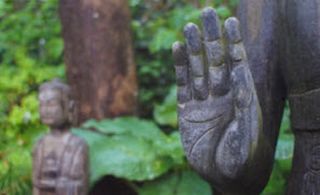Anxiety
Does It Feel Safe With Other People?
We're usually more uneasy or guarded around others than we truly need to be.
Posted August 14, 2017

Does it feel safe with other people?
The Practice:
Relax needless fear around others.
Why?
We all know this fear. You're walking down a street, someone you don't know comes toward you, and there's a second or more of wariness, scanning, apprehension, and tension or bracing in the body: a barely conscious assessment of possible threat. Or you step into a meeting with people you know and still there could be a watchfulness, a restraint, a certain carefulness in how you speak that comes more from subtle anxiety than reasonable prudence. Perhaps someone disagrees with you in this meeting — and you feel uneasy, off balance, unprotected; maybe later you worry what others thought about how you responded to the disagreement: Was I too irritated and pushy? Do they think I'm defensive? What should I do next time? When you get home, let's say your teenage son is quiet and prickly as usual. You want to tell him that the chilly distance between you feels awful, and you want to open your heart to him . . . but it feels awkward, you're afraid of making things worse, and when you spoke from the heart while growing up it did not go well and the fears reaching back into your childhood shadow and strengthen your fears today, so you say nothing, again.
And these are just the milder anxieties. Consider stronger ones, such as common fears about others getting angry, public speaking, being vulnerable, talking with authority figures, what others might think about your body, or being around people who aren't like you.
Sometimes these fears are justified. People at home or work might actually want to hurt you. On a larger scale, think about Europe as it lurched into World War II, a time when many people treated others terribly, and when underestimating this threat had devastating consequences; there are many similar examples.
But often our fears around other people are not justified. They could care less about what we did — we are usually just a bit player in their own personal drama, anyway — or if they do care, it's a passing feeling. Even if the other person does react, most likely you could handle it fine. Further, if there truly is something to deal with — a conflict, issue, broken agreement, betrayal — it is possible to be clear-eyed, strong, straightforward, confident, and secure without being anxious about it (see the chapter on kindness and assertiveness in Buddha's Brain). Anxiety is something added to our response to situations; sometimes it's helpful, but usually it clouds thinking, adds needless suffering, and fuels conflicts with others.
So there are two kinds of mistakes we can make: having too little or too much anxiety around others. We should do our best to avoid making either kind. But which mistake is more common?
It's the second one: needless anxiety stirred into the sauce of life, making it bitter.
How?
Be mindful of anxiety around others, especially subtle unease, concern, tension, nervousness, or worry. Tune into your body, that little jump in heart rate or funny feeling in the pit of your stomach. Watch the thoughts passing through, the quiet murmuring in the back of the mind that overestimates threats and underestimates resources, that predicts problems which are actually unlikely.
Be aware of the costs to you of unnecessary — not useful, not valuable — anxiety. Besides feeling bad, it makes a person play smaller with others, hold back his or her truth, and hunker down — or go to war, in ways small or large. Then really decide in your heart if you want to be free of this worthless fear.
With someone who you know cares about you, try saying to yourself (adapt my suggestions to your needs): I know you're not going to attack me. Find your way to having the statement ring true, and then see how you feel. Do it again with this statement to yourself: Even if you did attack me, I would still be OK in the core of my being. Let the truth of this and related good feelings sink into you. Here's another one: I can take care of myself around you. Let this, too, sink in. And: If you hurt me, I'll still be OK in my core. And: I wish you well. If you have any difficulty with this practice, try other people who love you. The essence here is to feel your way into a place in which you recognize others and situations as they truly are, you take care of your own needs, and no needless anxiety is added.
Then try this practice with one or more friends . . . and then with a neutral person, such as a stranger on the street . . . and then even with someone who is difficult for you. If there is truly something to be anxious about, so be it. Otherwise, keep opening to the experience of being realistic about others and strong on your own behalf — without feeling any pointless fear.
Also try this approach when interacting with others. Can you talk with a family member, a friend, a neutral person, and a difficult person without one bit of unnecessary worry, alarm, sense of threat, or uneasiness? As you deepen your sense of being appropriately fearless with others, keep letting this experience sink in so you become increasingly grounded in this way or being.
Enjoy the sense of freedom this practice brings, the greater ease with others, the confidence. Notice how you can be more relaxed, patient, open, and caring with other people when you are not afraid.
What a comfort, and what a relief.
Rick Hanson, Ph.D., is a psychologist, Senior Fellow of the Greater Good Science Center at UC Berkeley, and New York Times best-selling author. His books are available in 26 languages and include Hardwiring Happiness, Buddha’s Brain, Just One Thing, and Mother Nurture. He edits the Wise Brain Bulletin and has numerous audio programs. A summa cum laude graduate of UCLA and founder of the Wellspring Institute for Neuroscience and Contemplative Wisdom, he’s been an invited speaker at NASA, Oxford, Stanford, Harvard, and other major universities, and taught in meditation centers worldwide. His work has been featured on the BBC, CBS, and NPR, and he offers the free Just One Thing newsletter with over 120,000 subscribers, plus the online Foundations of Well-Being program in positive neuroplasticity that anyone with financial need can do for free.


